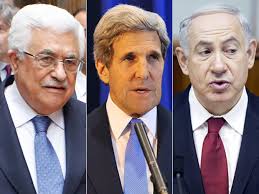 Could Israel be considering a momentous concession that would change the course of 46 years of history with the Palestinians?
Could Israel be considering a momentous concession that would change the course of 46 years of history with the Palestinians?
A news report, a show of goodwill and diplomatic murmurs by the United States and its Arab partners are stoking hopes that a glacial budge in its position could lead Israelis and Palestinians to talk seriously about peace again.
Reuters news agency quoted an Israeli official last week who said Israel agreed to a plan for peace talks based on pre-1967 borders and land swaps.
It is something the United Nations demanded in a resolution in 1967 and has been the gold standard of yearnings for Middle East peace ever since. It requires Israel to withdraw from occupied territories completely and the Palestinians to recognize the existence of an Israeli state.
Israel denies report
Israel’s public relations apparatus immediately denied the report. Prime Minister Benjamin Netanyahu’s spokesman Mark Regev told CNN on Saturday he could not imagine who in the government would say something like that.
But on the same day, Israel announced it would unilaterally release a number of Palestinian prisoners in a gesture of goodwill, given the prospects for new talks.
“As the negotiations proceed, Israel agrees to free, as a goodwill gesture, a limited number of prisoners during the period of the negotiations,” said Yuval Steinitz, Israel’s Minister of Strategic Affairs. It is not yet clear how many prisoners will be released and who they will be.
Whatever the magic ingredient is that could be drawing Israel and the Palestinians to the negotiating table, all parties involved are holding their tongues about it.
U.S. Secretary of State John Kerry wants people to stop guessing what it is.
“Any speculation or reports you may read in the media … are conjecture … because the people who know the facts are not talking about them,” he said.
He said he will say something when the time is right — side-by-side with the proper leaders.
Those will likely be Netanyahu and Palestinian Authority President Mahmoud Abbas.
Kerry praised their “courageous leadership,” saying they had chosen to make difficult decisions.
It “establishes a basis for resuming direct final status negotiations between” Palestinians and Israel, Kerry said Friday from Jordan.
And they could happen fast. The two sides will join him in Washington “for initial talks within the next week or so” if things keep working out, Kerry said.
Palestinian officials surprised
Developments have come so rapidly that they have caught Palestinian leaders around Abbas off guard, said a senior Palestinian official who did not want to be named due to the sensitivity of the situation.
The officials are asking for guarantees and have lots of questions.
For some, hope is mixed with pessimism built up through decades of futile negotiations and bloody relations between Israelis and Palestinians.
Talks “are bound to fail sooner than later” if there is no commitment to clear terms, such as a freeze on Israeli settlements in occupied territory, said Mustafa Barghouti, a prominent Palestinian legislator and head of a political party.
Israeli reaction
On Sunday, Netanyahu spoke as though peace talks were definite.
“These will not be easy negotiations,” he said as he opened a Cabinet meeting. “We will enter into them with integrity, sincerity and the hope that this process will be conducted responsibly.”
Israel’s defense minister said Saturday that his government wants to waste no time getting started with the peace talks.
“We are getting to the negotiations with clean hands and great desire to get to an arrangement that will end the conflict,” Moshe Ya’alon said.
Israeli Justice Minister Tzipi Livni lauded the prospect of peace in a statement.
“Four years of political stagnation are coming to an end.”
Understanding 1967
To understand the excitement over the rumored concessions — if they are indeed a possibility — one needs to go back to the dawn ofthe Six-Day War.
In June 1967, Egypt, Syria and Jordan massed their troops on Israel’s borders in preparation for an all-out attack.
Israel launched a pre-emptive strike on June 5, targeting Arab air fields and destroying the Egyptian air force on the ground.
Egypt had set up a sea blockade against Israel the day before, according to the U.S. Office of the Historian.
Military skirmishes and bellicose gestures between Israel and many of its Arab neighbors had reached a crescendo. Syria threatened to push Israel into the sea. Egypt allied with the Syrians.
Israel captured lands from each of Egypt and Syria and occupied them.
The United Nations demanded in Security Council Resolution 242that Israeli troops withdraw and give the lands back. The resolution required all states involved to recognize each other’s existence.
At first, Israel held on to the lands. And Arab states refused to recognize Israel as a state.
Over time, things changed. Cairo and Jerusalem made peace in a deal brokered by U.S. President Jimmy Carter at Camp David, and Israel handed the largest captured chunk, the Sinai Peninsula, back to Egypt.
Jordan and Israel mended relations.
Israel withdrew from Gaza, dozing its former settlements on its way out.
But it has hung on to the West Bank, and the Palestinians have refused to recognized Israel as a state.
After decades of waiting, many hold out hope that new negotiations could ultimately bring about a resolution.
CNN

Leave a Reply
You must be logged in to post a comment.